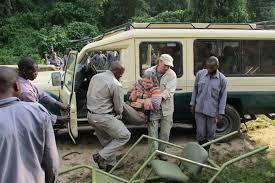'People with Disability Ignored in Uganda's Tourism'
 Submitted by jbimokola on
Submitted by jbimokola on

Over the years, Uganda has been experiencing a steady increase in the number of tourists who mainly come to view fauna and flora, and for that reason modern facilities have been constructed and new courses in the academic field developed to further take Uganda’s tourism to a much higher and professional level.
Sadly, the thought of disabled persons participating in tourism activities of any kind is considered a joke, given the fact that they are taken to be poor and helpless with no source of income.
Sharon Nalubega was born with arthrogryposis, a congenital condition that causes severe contractures of the joints. She is part of the “people with disabilities” aiming at drumming up efforts to explore their interests in travelling and involvement in tourism activities.
Nalubega has regrets for the path she decided to take while still a senior two student at Bulo Parents Secondary School in 1987, because some people viewed her as a sub-human and hence incapable of participating in any activity tourism inclusive.
“At school, we had a wildlife club and I was the head. We used to organize debates and quiz about nature, and I won many prizes and certificates from Nature Uganda,” she says.
Willy Muganga, who doubled as a patron for the wildlife club and a teacher for Geography at Bulo Parents then, also encouraged Nalubega to participate in any activity like able-bodied people.
“Although Nalubega was a wheel chaired student, she had good working ethics. She was hardworking, bright and talented when it comes to the issues of wildlife and environment,” said Hadijja Nakimuli, the headmistress of Bulo Parents.
Nalubega however left school for craft-making to earn income and fulfill her dream of exploring the world.
After saving some money, Nalubega found herself in a line at a tour company to buy some tour packages for her family. She watched a travel agent walk down the line and when she got to Nalubega and saw her condition, she asked “what are you doing here?” Her perception of disabled people getting involved in tourism was a laughable matter.
The gent said to her “Let us be realistic woman, do you think that someone is ready to invest their money in something that is not profitable? First of all, you are illiterate, unemployed and therefore poor. Can you take up a forest walk? You are not going to participate in any tourism activity.”
The deep sorrow she got then is still visible on her face as she speaks.
Nalubega is now demanding that government and planning agencies should put them into consideration in tourism issues, so that they can access tourism packages by putting in place like ramps with simply inclined plains on buildings for easy movement of wheel chairs.
She adds that tourism stakeholders, service providers, destination owners and the tourism industry are missing out on a lot of money because of lacking information on which facilities should be developed and how or where they should be developed.
Agnes Nekesa, a General Manager of Riki Tours and Travel Company says lack of interest to cater for the disabled people is because they are so difficult to handle, also expensive and the annual budgets of the tourism destinations cannot stretch to avail such needs.
“We had a guest who was a wheel chair bound taking up accommodation in one of these high class hotels, however, it took four people to carry him in and out of his room because the door was too narrow for the wheel chair,” Nekesa said.
According to Albert Ndeezi, an official of the National Union of Disabled Persons of Uganda (NUDIPU), every human being in the world has a right to tourism activities. No obstacle should be placed in the way of participation in tourism activities and enjoyment of the natural world, Ndeezi adds.
“Facilities can be made accessible even with minimal resources, however, the negative attitudes towards disabled people are hindrance and hence they are not viewed as potential customers. Disabled people end up being left out in tourism because these facilities are not available,” Ndeezi added.
He also urged that participation in tourism activities provides relief from tension, boredom, and anxiety. Therefore, it is viewed positively as it is seen as a phenomenon which improves happiness for these people.
- Log in to post comments
- 295 reads
